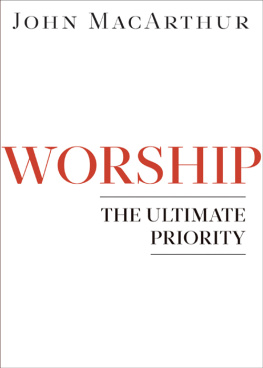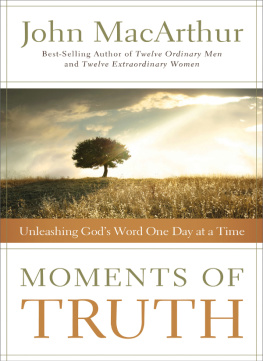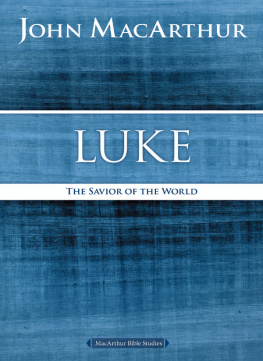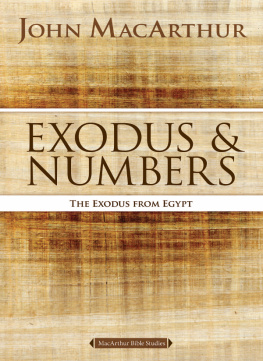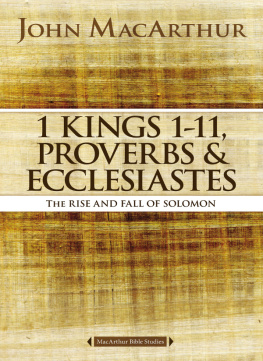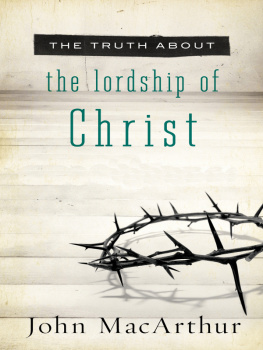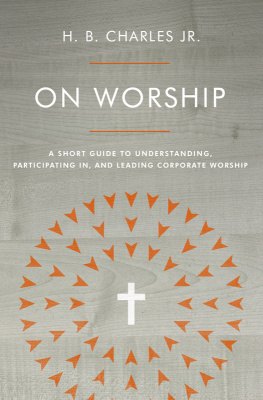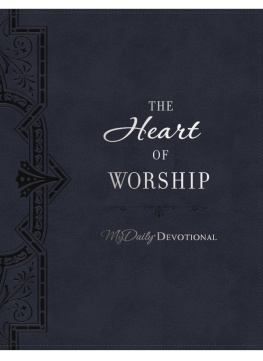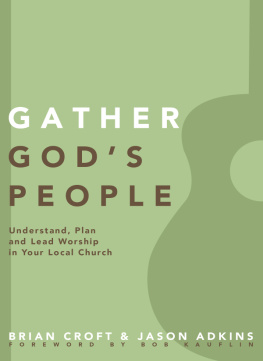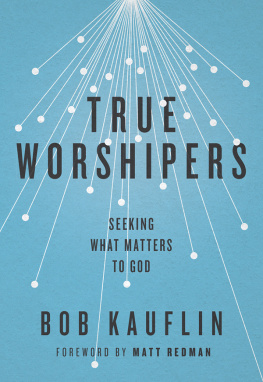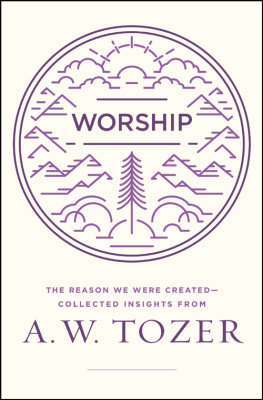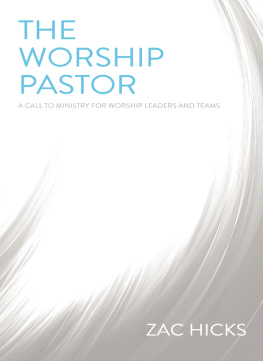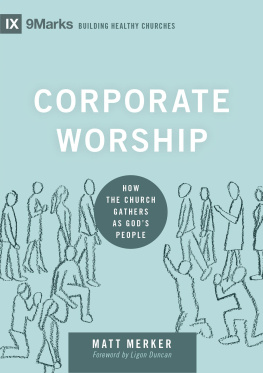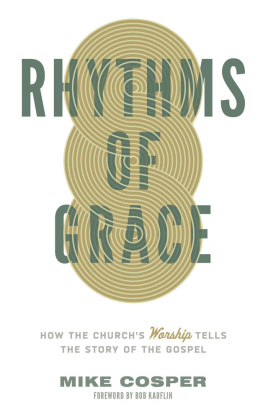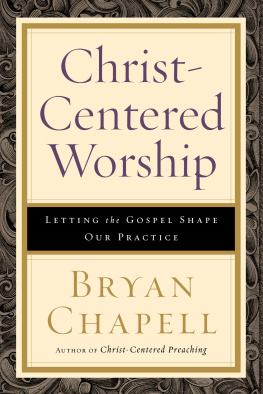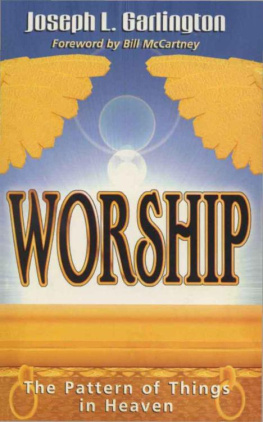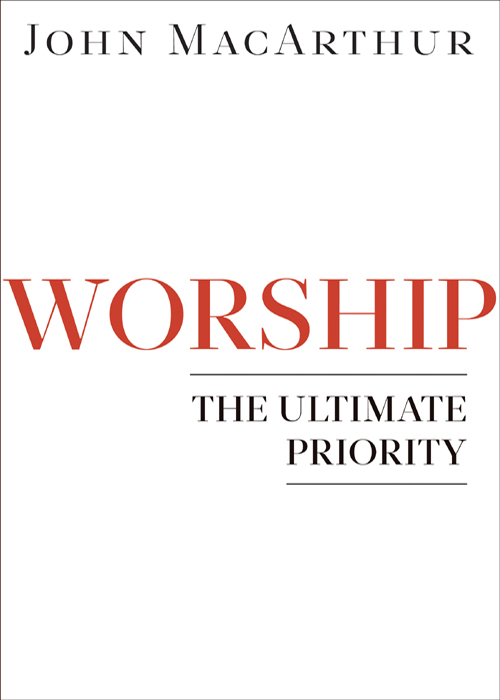WORSHIP

THE ULTIMATE
PRIORITY

J OHN M AC A RTHUR
M OODY P UBLISHERS
C HICAGO
1983, 2012 by
J OHN M AC A RTHUR
Previously titled The Ultimate Priority
All rights reserved. No part of this book may be reproduced in any form without permission in writing from the publisher, except in the case of brief quotations embodied in critical articles or reviews.
All Scripture quotations, unless otherwise indicated, are taken from the New American Standard Bible, Copyright The Lockman Foundation 1960, 1962, 1963, 1968, 1971, 1972, 1973, 1975, 1977, 1995. Used by permission. (www.lockman.org)
Scripture quotations marked ESV are taken from The Holy Bible, English Standard Version. Copyright 2000, 2001 by Crossway Bibles, a division of Good News Publishers. Used by permission. All rights reserved.
Scripture quotations marked KJV are taken from the King James Version.
Chapter 2, How Shall We Then Worship?, is adapted from material first published in The Coming Evangelical Crisis (Chicago: Moody, 1996).
The appendix, With Hearts and Minds and Voices, is adapted from an article first published in The Christian Research Journal (vol. 23, no. 2), 38ff.
ISBN: 978-0-8024-0215-8
Cover design: Kathryn Joachim
Interior design: Ragont Design
We hope you enjoy this book from Moody Publishers. Our goal is to provide high-quality, thought-provoking books and products that connect truth to your real needs and challenges. For more information on other books and products written and produced from a biblical perspective, go to moodypublishers.com or write to:
Moody Publishers
820 N. LaSalle Boulevard
Chicago, IL 60610
1 3 5 7 9 10 8 6 4 2
Printed in the United States of America
To the memory of Dale and Lorraine Smith, with gratitude that they gave the Savior their lives and me their daughter.
Contents
T HE PSALMIST AFFIRMS HUMANITYS ultimate priority with an earnest call to worship our Creator: Give unto the Lord the glory due unto his name; worship the Lord in the beauty of holiness (Psalm 29:2 KJV). That is our supreme duty for time and eternityto honor, adore, delight in, glorify, and enjoy God above all His creation, as He is worthy to be worshiped.
My own heart has been relentlessly stalked by the lion of worship over the years as I have traversed the pages of Scripture. My mind has been repeatedly arrested by the awesome majesty of the One we worship; by the ineffable glory of His perfect holiness; and by the pathetic reality of how far short we routinely fall in giving Him the honor He deserves.
I know that redemptive history is moving along a very narrow path that will someday widen into what Isaiah calls the Highway of Holiness. There the ransomed of the Lord forever will worship with joyful shouting and everlasting joy upon their heads (Isaiah 35:810). I long for that day, and I want a taste of it even now. That should be the hearts desire of every believer. As a matter of fact, whom and how you worship now reflects the hope of your eternal destiny.
In my ministry, I have always longed to lead people to a personal encounter with the majesty of our living, holy God. But for years I fell far short of fully understanding what worship was and how it was to be accomplished. Out of personal frustration with my own failures in worship and a deep, growing concern for a contemporary church that seemed to know as little as I did about true worship, I sought a better understanding of the Bibles message on the subject. One of the first things I discovered is that authentic worship is not a narrowly-defined activity relegated to the Sunday morning church serviceor restricted to any single time and place, for that matter. Worship is any essential expression of service rendered unto God by a soul who loves and extols Him for who He is. Real worship therefore should be the full-time, nonstop activity of every believer, and the aim of the exercise ought to be to please God, not merely entertain the worshiper.
In January of 1982, while preaching through John 4, I realized that I should be pursuing the stalking lion, rather than vice versa. It was a significant turning point in my ministry and in the life of our church. A new awareness that ceaseless worship ought to be every Christians highest priority revolutionized and reinvigorated our people.
I long to see these truths unleashed among evangelical Christians worldwide. A solid, biblical understanding of true worship would be the perfect antidote to the pragmatic, program-driven, prosperity-obsessed mentality so many evangelical churches now cultivate. By striving so hard to fulfill human needs, satisfy human desires, manipulate human emotions, and massage the human ego, the church somehow seems to have lost sight of what worship is supposed to be about. The typical church today is actually practicing a kind of populist religion that is all about self-love, self-esteem, self-fulfillment, and self-glory. All those things point people in exactly the opposite direction from true worship.
But there appears to be scant concern today about worshiping our glorious God on His own terms. At one end of the spectrum, worship seems to mean little more than some rote liturgy in a starched and stuffy setting with stained-glass windows, organ musicperhaps even incense and priestly vestments. At the other extreme, worship aims to be as casual and as relaxed as possible, reflecting an easy familiarity with God unbefitting His transcendent majesty. This type of worship seems to aim chiefly at making sinners comfortable with the idea of Godpurging from our thoughts anything like fear, trembling, reverence, or profound biblical truth.
In the minds of many contemporary evangelicals, the word worship signifies the musical portion of the order of service, as opposed to the sermon or the offering. The chief musician is called the worship leader to distinguish him from the pastor (whose role apparently is perceived as something other than leading people in worship).
Music is, of course, a wonderful medium for worship. But true worship is more than just music, and musiceven Christian musicis not necessarily authentic worship. Music can be an instrument for the expression of worship, but there are other spiritual disciplines that come closer to the essence of pure worshipactivities like prayer, giving, thanksgiving, and listening to the Word of god as it is proclaimed and expounded. It is significant that Jesus spoke of truth, not music, as the distinctive mark of true worship (John 4:2324).
But many people do not feel they have worshiped at all until they have been swept into a trancelike state of nebulous passion, usually by a series of choruses. Thats why so many songs written for corporate singing are long and repetitiveand they are deliberately sung in a certain order so that the tempo, beat, and volume build to a stunning climax.

